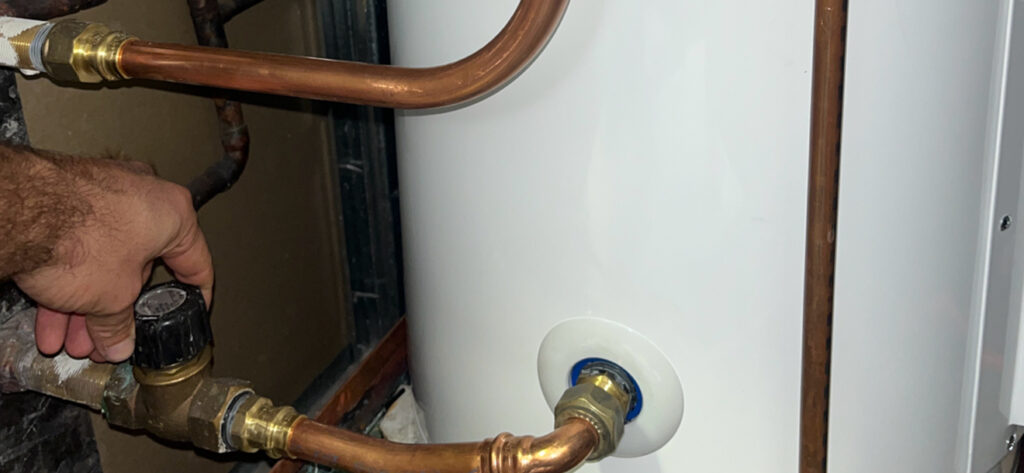
Open 24/7! Servicing all of Sydney’s Eastern Suburbs
Our Average Response time is: 1hr 53min 47sec
Even here in sunny Australia, winter can be tough on your plumbing including pipes, fixtures and appliances. But never fear, with a little preparation you can prevent costly damage, ensuring your home stays warm and functional throughout the season.
And that's what we're going to share with you in this article; five practical winter plumbing tips to keep your plumbing in optimal health as the cold sets in.
Even though Sydney’s weather is known for its mild winters, sudden cold weather snaps can still create issues for your plumbing. Even without freezing cold, extremely fluctuating temperatures combined with seasonal rainfall can stress your pipes. Warm air and quickly turn to cool air and understanding how to winterise your plumbing can be beneficial to avoid unexpected issues.
There are several measures you can take to keep your plumbing in top condition, protect your home and provide peace of mind throughout the cooler months.
First things first, before winter fully sets in, inspect your plumbing system for any potential issues.
Look for exposed pipes, leaks, corrosion and any other vulnerabilities. Pay special attention to unheated areas like basements, crawl spaces, and attics, as indoor plumbing in these spaces is particularly prone to the cold.
One way to protect your plumbing is to insulate exposed pipes with foam pipe insulation. This simple and cost-effective solution helps maintain a stable temperature and prevents pipes from freezing.

Outdoor plumbing is the most vulnerable during winter, but there are preventive measures you can take. As winter approaches, start by disconnecting and draining outdoor garden hoses to avoid hidden freezes that can lead to burst pipes.
Next, shut off the outdoor water supply with the primary shutoff valve to safeguard sprinkler systems and faucets from freezing temperatures. You might also want to get up on your ladder and check for roof leaks and any clogged gutters as the water build-up is more prone to freezing temperatures.
While not completely necessary for Sydney, to add an extra layer of protection, you can insulate outdoor faucets and exposed pipes with covers or foam insulation. If you choose to DIY you can get these materials from your local Bunnings. The extra layer of defence helps prevent freezing and bursting.
Take a walk around your home and check for gaps or cracks where pipes enter the walls—these sneaky openings can let cold air in and create big problems when temperatures drop.
The fix is simple: grab some caulk or spray foam and seal those cracks tight. Not only will this protect your plumbing, but it’ll also keep your home warmer and more energy efficient.
Before the chill sets in, you'll want to check your hot water system. After all, there's nothing worse than a cold shower on a chilly winter morning! Look for signs of wear, leaks, or unusual noises that could indicate trouble.

If you're unsure, consider enlisting the help of a professional. Not only does it offer peace of mind, but it can also extend the lifespan of your hot water system, save you heating costs and, most importantly, ensure your hot shower doing the winter chill!
Now, in the rare case that temperatures do drop towards zero, you may be worried about pipes freezing. Never fear, there's an easy trick: let your faucets drip slightly. This is because the movement of water, even just a trickle, helps prevent pipes from freezing. You only need to apply this for pipes located along exterior walls.
After a longer-term solution to avoid frozen pipes? Consider insulating your pipes. While there’s an upfront cost, it’s a smart investment for your home's plumbing system compared to the expense of wasted hot water. Or worse, repairing burst pipes.
The best step you can take to prepare for winter is to schedule a professional plumbing inspection. An Eastern suburbs-qualified plumber can spot potential plumbing issues you might miss. They have specialised equipment to detect hidden leaks or vulnerable pipes and provide expert advice on winterising your system.

Think of it as a preventative investment that saves you from costly repairs down the line. With professional guidance, you can have peace of mind that your home’s plumbing is ready to handle whatever winter throws your way—leaving you free to enjoy a warm, cosy and stress-free season.
Inspect and insulate exposed pipes, check for leaks, and schedule a professional inspection with a trusted plumber. Taking these preventive steps early in the season can save you thousands in potential water damage repairs.
Insulate pipes, seal gaps and cracks with caulk or spray foam, and let faucets drip during extreme cold.
Drain outdoor pipes, insulate exposed areas, and ensure your water heater is functioning efficiently.
Consider installing a smart thermostat to monitor temperatures and alert you to potential conditions that could affect your plumbing system.
Shut off outdoor water supplies, drain the lines, and use pipe covers to protect them from freezing temperatures.
If you happen to live in a more extreme cold climate, such as Jindabyne, there are some further steps you can take to protect your plumbing. Use heat tape to provide direct heat to high-risk pipes, preventing them from freezing.
Insulate your garage door and add heat cables to exposed pipes to keep your garage warm and seal rim joists to block cold air from entering and coming into contact with plumbing pipes.
Implement these five tips ahead of time to safeguard your plumbing system for winter and avoid costly repairs. From insulating exposed pipes and protecting outdoor plumbing to sealing gaps, maintaining a consistent interior temperature, and inspecting your hot water system, these proactive steps will keep your home running smoothly all season.
If you're after more expert help and peace of mind, contact Plumberoo Plumbing—your trusted Sydney professional plumbers keeping your home winter-ready.